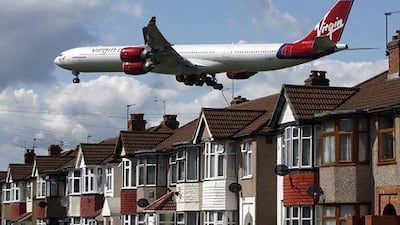Singapore Airlines (SIA) is in talks to sell its stake in the British carrier Virgin Atlantic.
The Asian carrier yesterday confirmed there were ongoing discussions with “interested parties”, but cautioned a deal was not inevitable.
Sir Richard Branson, who founded Virgin Atlantic almost 30 years ago, sold 49 per cent of the airline to SIA in 1999 for US$962 million (Dh3.53 billion). But in the past year, the Asian carrier has been looking to offload its stake.
SIA has declined to name the “interested parties” but the American airline Delta has been named as the likely suitor. Delta was in talks last year with SIA to acquire the Virgin stake, but walked away over the asking price, rumoured to be $500 million to $600m.
Andrew Orchard, a regional airlines analyst at CIMB Research, said SIA’s decision to sell was the result of disappointed expectations in the value of the Virgin stake, and a switch in the Asian carrier’s strategic operational focus. However, he was not optimistic that the sale would go ahead.
“When Singapore bought Virgin, they expected to be given some approval to fly transatlantic routes out of London, but that was not given,” said Mr Orchard.
“If Virgin is valued on an earnings basis, then it’s hard to see Singapore Airlines getting a good price. On the other hand, Singapore is not desperate for cash and they probably won’t sell it at a fire-sale price.”
The talks follow the end of SIA’s relationship with the Australian carrier Qantas, which did a deal with Emirates Airlines in September to switch its Asian hub from Singapore to Dubai and route its Asia-Europe traffic through the UAE.
Since then SIA has been withdrawing from the crowded European market to concentrate on the rapidly expanding budget airline industry in South East Asia and Australia.
It is refocusing on its key markets where it is under pressure from budget carriers, launching its own low-cost airline, Scoot, and bolstering its own Asian regional carrier, SilkAir, which signed a provisional deal in August for 54 Boeing 737 planes to double its fleet.
SIA bought a 10 per cent stake in October in Sir Richard’s Virgin Australia carrier for $108.5m. The deal underlined the carrier’s intent to focus on the Far East, giving Singapore Airlines its first direct stake in Australia’s aviation market, where Virgin is the second biggest airline after Qantas.
Last month, Singapore Airlines reported a second quarter profit of $90m, down 54 per cent from a year ago.
The results showed that for the first half of the current financial year, its earnings fell 30 per cent to $168m. Revenue for the six months to the end of September grew 4 per cent to $7.57bn, on the back of 8 per cent growth in the number of passengers carried.
Any sale would be to SIA’s advantage, according to the Asian aviation consultant, Centre for Aviation (Capa). “They’ve had this stake for 13 years and it’s just been a drain,” said Peter Harbison, the executive chairman of Capa. “It’s one of the bigger mistakes that they’ve made.”
Timothy Ross, a Singapore-based Credit Suisse analyst, described SIA’s current position as “a lame duck” minority shareholder in Virgin. “The relationship has contributed little in terms of cash flow or synergies.”
The airline also no longer needed the extra access at Heathrow because it flew Airbus A380 superjumbos to the airport, said Arnaud Bouchet, an analyst for BNP Paribas.
With the European economic slowdown damping travel demand, the double-decker A380 was able to cope with Singapore Airlines’ current loads, he said.
Sir Richard, who owns 51 per cent of the airline, set up Virgin Atlantic in 1984.
However, the airline has been battered by rising fuel prices and the euro-zone crisis, and posted a loss of about £80 million (Dh471.6m) in its last full year.
As a result, Sir Richard has been considering Virgin’s future and nearly signed a deal with Air France-KLM in February last year, having appointed Deutsche Bank to look into possible offers.

